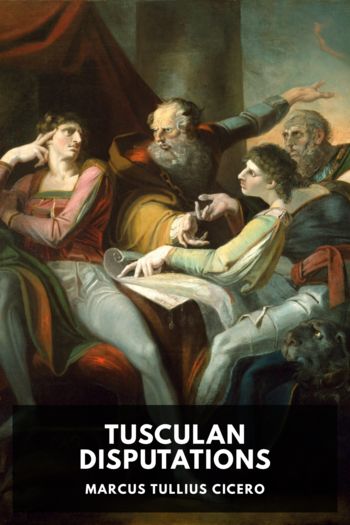Tusculan Disputations, Cicero [good book recommendations TXT] 📗

- Author: Cicero
Book online «Tusculan Disputations, Cicero [good book recommendations TXT] 📗». Author Cicero
What reason shall I assign, O Brutus, why, as we consist of mind and body, the art of curing and preserving the body should be so much sought after, and the invention of it, as being so useful, should be ascribed to the immortal Gods, but the medicine of the mind should not have been so much the object of inquiry while it was unknown, nor so much attended to and cultivated after its discovery, nor so well received or approved of by some, and accounted actually disagreeable, and looked upon with an envious eye by many? Is it because we, by means of the mind, judge of the pains and disorders of the body, but do not, by means of the body, arrive at any perception of the disorders of the mind? Hence it comes that the mind only judges of itself when that very faculty by which it is judged is in a bad state. Had nature given us faculties for discerning and viewing herself, and could we go through life by keeping our eye on her—our best guide—there would be no reason certainly why anyone should be in want of philosophy or learning; but, as it is, she has furnished us only with some feeble rays of light, which we immediately extinguish so completely by evil habits and erroneous opinions that the light of nature is nowhere visible. The seeds of virtues are natural to our constitutions, and, were they suffered to come to maturity, would naturally conduct us to a happy life; but now, as soon as we are born and received into the world, we are instantly familiarized with all kinds of depravity and perversity of opinions, so that we may be said almost to suck in error with our nurse’s milk. When we return to our parents, and are put into the hands of tutors and governors, we are imbued with so many errors that truth gives place to falsehood, and nature herself to established opinion.
To these we may add the poets, who, on account of the appearance they exhibit of learning and wisdom, are heard, read, and got by heart, and make a deep impression on our minds. But when to these are added the people, who are, as it were, one great body of instructors, and the multitude, who declare unanimously for what is wrong, then are we altogether overwhelmed with bad opinions, and revolt entirely from nature, so that they seem to deprive us of our best guide who have decided that there is nothing better for man, nothing more worthy of being desired by him, nothing more excellent, than honors and commands, and a high reputation with the people—which indeed every excellent man aims at—but while he pursues that only true honor which nature has in view above all other objects, he finds himself busied in arrant trifles, and in pursuit of no conspicuous form of virtue, but only some shadowy representation of glory. For glory is a real and express substance, not a mere shadow. It consists in the united praise of good men, the free voice of those who form a true judgment of preeminent virtue. It is, as it were, the very echo of virtue, and being generally the attendant on laudable actions, should not be slighted by good men. But popular fame, which would pretend to imitate it, is hasty and inconsiderate, and generally commends wicked and immoral actions, and throws discredit upon the appearance and beauty of honesty by assuming a resemblance of it. And it is owing to their not being able to discover the difference between them that some men, ignorant of real excellence and in what it consists, have been the destruction of their country and of themselves. And thus the best men have erred, not so much in their intentions as by a mistaken conduct. What? is no cure to be attempted to be applied to those who are carried away by the love of money, or the lust of pleasures, by which they are rendered little short of madmen, which is the case of all weak people? or is it because the disorders of the mind are less dangerous than those of the body? or because the body will admit of a cure, while there is no medicine whatever for the mind?
But there are more disorders of the mind than of the body, and they are of a more dangerous nature, for these very disorders are the more offensive because they belong to the mind and disturb it, and the mind, when disordered, is, as Ennius says, in a constant error: it can neither bear nor endure anything, and is under the perpetual influence of desires. Now, what disorders can be worse to the body than these two distempers of the mind (for I overlook others): weakness and desire? But how, indeed, can it be maintained that the mind cannot prescribe for itself, when she it is who has invented the medicines for the body, when, with regard to bodily cures, constitution and nature have a great share, nor do all who suffer themselves to be cured find that effect instantly, but those minds which are disposed to be cured, and submit to the precepts of the wise, may undoubtedly recover a healthy state? Philosophy is certainly the medicine of the soul, whose assistance we do not seek from abroad, as in bodily disorders, but we ourselves are bound to exert our utmost energy and power in order to effect our cure. But as to philosophy in general, I have, I think, in my Hortensius, sufficiently spoken of the credit and attention which it deserves. Since that, indeed, I have been continually





Comments (0)